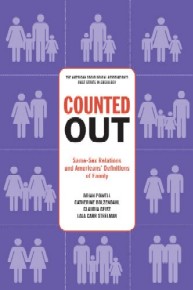First, let me say I am a fan of David Brooks’ political commentary. But I can’t always say this about his thinking on sociological issues. Take his recent op-ed, “The Age of Possibility” in The New York Times. You’ll see that he needs to expand his thinking about people who don’t have kids …and singles as well.
He writes that we’re in an “age of possibility,” meaning having entered into a time when people are “intolerant of any arrangement that might close off their personal options.” He has concerns about those who “go through adulthood perpetually trying to keep their options open,” and how this will affect society.
Specifically, who is he talking about? Those who don’t choose the two-parent family structure — namely, those who remain single and people who don’t have children.
Brooks sees societies as in the midst of moving from being “oriented around the two-parent family” to “cafeteria societies with many options.” These options include the many faces of family in today’s society. Sociology researcher Brian Powell has researched how today’s Americans define family. Results in his book, Counted Out, examine how men and women of different ages, races, religions, and socioeconomic backgrounds view what constitutes a “family.”
In Powell’s study, 100 percent of those surveyed thought a married heterosexual couple with kids was a family. No surprise. Eighty-three percent considered unmarried heterosexual couples with kids to be a family, and 64 percent would say that same-sex couples with kids are a family.
Ninety-two percent thought that a married, heterosexual couple without kids was a family. Forty percent considered unmarried heterosexual couples with no kids a family. And 33 percent thought same-sex couples without kids were a family.
Can singles be part of a family — other than the family they came from, that is? Many singles who have a close-knit set of friends or a tight support structure of people they are not biologically related to (including parents and not) would say yes. To them, their family-centered life is less about blood or by-marriage relation, and more about life-long bonds of caring and support.
In the cafeteria of ways to be a “family,” one does not have to be married or have children. But do people stay single or not have kids because they are perpetually trying to keep their options open in life?
Hardly. This reflects the belief that marrying and raising children is the path to adulthood. Related to this view is the belief that if you don’t want to marry and have children you somehow don’t truly become a full-fledged adult.
Thanks to pronatalist social and cultural conditioning, these beliefs have become so engrained that we think they are truths. But the truth is they are myths.
Just because people decide not to marry or have children does not automatically mean they have “maximum personal freedom to do what they want.” It doesn’t mean they aren’t or won’t become mature adults. There are many paths to adult maturity. It’s reflected in things like finding vocation, attaining financial independence, and showing financial responsibility. It means having emotional intelligence, understanding the value of humility over hubris, and finding meaning in life beyond materialism.
It also means engaging in “commitments that transcend personal choice.” Just because someone doesn’t marry or have children doesn’t mean they won’t want this because it will cramp their style. Those who don’t marry or have children deeply commit to their loved ones. They can contribute to their communities and our world, and do, sometimes more than those with children because parenthood is not the central focus of their lives.
Brooks seems reluctantly open to other “commitment devices” outside the two-parent model, but he’s still stuck in outmoded thinking about adulthood and family. Traditional family is not the only way to “induce people to care about others, become active in their communities and devote themselves to the long-term future of their nation and their kind.” People in all kinds of families want and do these things.
He suggests that “laws and attitudes should be biased toward family formation and fertility, including child tax credits, generous family leave policies.” A long time ago we reached a population where we no longer need to provide incentives for people to have children, especially whenever they want whether they are ready or not. Promoting pronatalist laws and attitudes also continues to reinforce inequitable workplace policies.
Brooks believes that we are better off when we think beyond ourselves and engage in action that serves others. Indeed. We’ll also be better off if we can move past outmoded thinking about family, and accept all of its forms that serve to bond us with those closest to us, and to our national and global family.






A lousy article from an otherwise good commentator (Brooks). It figures he mentioned god in his list of committments, thereby offending the growing group of people who have no religious affiliation (the “nones” in that recent survey.
Brooks needs to get out of the 1950s thinking.
Yeah I could do a whole other article on the God thing – totally agree with you on the 1950s thinking!
Dear Laura,
Thank you for mentioning and sticking up for the single person in your critique of this editorial. Many childfree sites emphasize that they and their significant others are a family and complain about the inequities that are often built into work schedules, the benefits structure, etc. for the childfree versus parents. However, there is no one quite so invisible–and expendable–in many people’s eyes, as the unchilded, unpartnered woman. She is definitely not considered a family, and since she cannot collect benefits to pay for her housing, tuition, food, and medical care based on being a mother, and has no partner’s income to share, this woman often is completely self-supporting with no safety net and no entitlements coming her way.
A related item: something that I find quite disturbing about the marriage-equality conversation in this country is the assumption that coupled=legitimate and that everyone should/wants to/can be/ paired up in this way. Living with a partner and raising kids are not the only ways to being a realized human. In fact, many mystical and religious traditions explicitly say that they aren’t the best ways. I think it’s really important to keep the single childfee of the world in mind when we stick up for childfree rights.
Thanks for all you do.
I was turned off by this piece for the reasons you mentioned too, and I usually like his columns (whether I agree with them or not). This statement was especially head-scratching: “As a practical matter, the traditional family is an effective way to induce people to care about others, become active in their communities and devote themselves to the long-term future of their nation and their kind.” These seem more like personality traits and values rather than feelings resulting from marriage and children.
I love the word “enshrouded” – what a telling choice of verbiage. Hey, I can play Chopin’s Funeral March on piano in case anyone would like to hire me to perform at a “commitment” ceremony.
And yes, “induce people to care about others” is a winner, too. What kind of a mindset feels the need to twist someone’s arm ’till they cry uncle and begin caring for others?
And Terry Ross: That’s an interesting point about the mystical and religious traditions not emphasizing coupled romantic love. Could you expand on that, or do you know of links that explore that issue further?
Yeah, those godless, selfish people who didn’t have children, didn’t follow traditional paths and so they never learned how to care about others. You mean (apparently) childfree and unmarried people like…Jesus?
Yeah! Amazing, isn’t it!
The religious traditions that I was thinking of were mainly those of the monastic tradition–men and women in religious orders who choose to forgo marriage and children to spend a life of contemplation within their cloisters, or who serve others through schools and hospitals. Catholic and Orthodox Christianity have seen people leading such lives as bearing witness to a higher truth because they are giving up good things to focus more on a closer relationship to God and other people even though you are not related to them. I imagine similar thinking is behind Buddhism’s monastic tradition (and the founder of Buddhism, Prince Siddhartha, left his wife and child to seek enlightenment…) Also, in ancient Rome, the Vestal Virgins were in charge of the archives of the Republic and were considered sustainers of it–and they were not to marry or have children–they were put to death if not celibate.
Yeah, childfree people are always gosh-darn selfish party animals, like those people who become monks and nuns. Sister Wendy has been drawing too many women over to the dark side of childfreesom with her wiles.
In his “Bobos in Paradise” and “On Paradise Drive” Brooks updates the utopian impulses which led those persecuted for being in rebellious Christian sects in Europe to come to the New World and ultimately form a new thread of Western Civilization. While it is true that an unbreakable optimism led to many successes especially given the tasks of taming a land that had reverted to the wilderness after the earlier Pre Columbian Civilizations had waned, the fact is not only the US but the World has reached a secular macroeconomic decline. Many factors form a sort of perfect storm that will challenge the existence of Civilization be it Western or other. Here is where that sunny do anything theme falls short. Being open to something besides the typical script may soon become a type of survival skill.
What I keep coming back to is the fact that a declining birth rate is still caused more by PARENTS than by childfree people. Parents are themselves on average having fewer children than their parents did, who had fewer children than their grandparents did, etc., for the past 200 years.
I bet there are more childfree people today for all the same reasons that parents have fewer children today. If there’s an epidemic of “selfishness” out there, everyone is part of it including people who decide to have “only one” kid.
The word “selfish” interests me when people use it with regard to having children or not. The definition of selfish is to focus on one’s own advantage, pleasure, or welfare. Who amongst us are not focused on our own advantages (job, promotion, etc), pleasures (fill in the blank on that one), or welfare (food, shelter)? Everyone seems motivated, to some degree, by selfishness.
Hi Melanie, Thanks for writing! I have defined selfishness as doing something we want for our own reasons Despite how it might impact others…and people can do that whether they have kids or not!